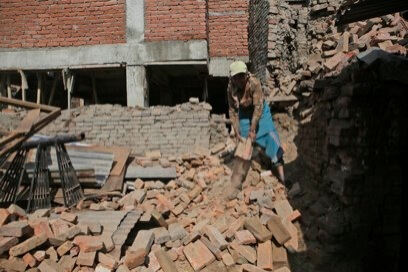By Naeisha Rose
Mayor Bill de Blasio’s office sent a letter to Secretary of Homeland Security Kirstjen Nielsen and Acting Secretary of State John Sullivan urging an 18-month extension for the Temporary Protected Status designation of Nepali New Yorkers.
If the Nepali TPS holders don’t get an extension on or before the April 25 deadline, their status will expire on June 24, according to the U.S. Citizenship and Immigration Services’ website.
There are 8,950 Nepali TPS holders across the country, according to the National Immigration Forum, an advocacy group for immigrants. There are approximately 8,000 Nepalese New Yorkers and 7,000 live in Queens, based on data from the Mayor’s Office of Immigrant Affairs.
Most Nepali Queens residents live in Jackson Heights, brick
Global cities consists of large populations of people from other parts of the world in one city, according to ethNYcity.
EthNYcity contends most Nepali people choose Queens, especially Jackson Heights, because of the borough’s diversity and the neighborhood’s large Southeast Asian population, which according to the U.S. Census, also includes Bengali, Pakistani and Indian populations.
Some members of the Nepali community came to the United States after their home country — located in the Himalayan mountain range in Southeast Asia — suffered two devastating earthquakes in 2015.
“I stand with Nepalese New Yorkers — the largest Nepalese community in the country — and call on the Department of Homeland Security to extend Nepal’s TPS designation for a full 18 months,” de Blasio said. “Forcing TPS recipients to return to a country still recovering from two calamitous earthquakes would be heartless and cruel.”
Nielsen of DHS had no comment.
On April 25, 2015, a 7.8-magnitude earthquake hit Nepal, which led to inadequate housing, infrastructure, health care and schools in the country, according to the Mayor’s Office of Immigrant Affairs.
The first quake struck the northwestern region of the capital city of Kathmandu and was followed by more than 100 aftershocks that led to the death of 8,500 people, many of whom were trapped in collapsed buildings, according to Oxfam, a global organization that works to tackle injustice and poverty. Hundreds of thousands of Nepali people were left without food, shelter, or medical care after the quake.
The United Nations reported that 90 percent of health facilities in four districts were severely damaged and that up to 90 percent of houses in two rural districts were destroyed in Nepal, the fourth poorest country in Asia.
On May 12, 2015, just 17 days later, a 7.3-magnitude earthquake shook the country, this time triggering landslides. Buildings that were damaged from the previous quake eventually collapsed, according to Oxfam.
The landslides blocked roadways, wrecked agriculture, killed livestock, and devastated the country’s markets. There were 22,000 people injured and about 750,000 houses were destroyed.
In 2016, representatives of Oxfam sent sleeping mats, blankets, solar lamps and seeds and provided shelter for 480,000 people. More than 200,000 toilets and 46 percent of the water supply in Nepal was destroyed. To help, the organization built 7,200 latrines and installed 159 water systems to prevent waterborne diseases. Still, there are 270,000 Nepali people displaced.
“Conditions in Nepal have not improved enough for the nation to reabsorb individuals who currently hold TPS status,” de Blasio said. “Nepalese New Yorkers with TPS would be forced to abandon the stability and livelihoods that they have found in New York. I urge you to recognize the extraordinary hardships caused by the country’s still incomplete recovery and extend Nepal’s TPS designation for an additional 18 months.”
Reach reporter Naeisha Rose by e-mail at nrose


































